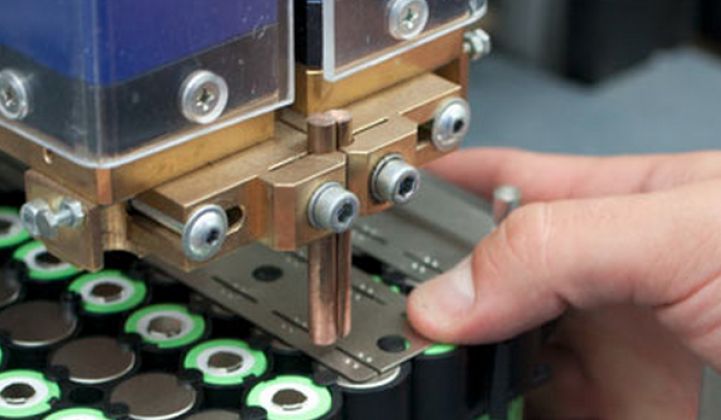Even in the budding battery market, increasing output 400 percent by 2020 is a very ambitious goal. But that’s what one of Germany’s top battery makers, BMZ, has announced this month.
And while a planned yearly output of 5 gigawatt-hours' worth of lithium-ion storage is not on the same scale as the Tesla Giga factory, BMZ’s plans clearly aren't lacking in ambition. But why such a huge expansion?
According to CEO and founder Sven Bauer, demand is growing enough to warrant expansion thanks to a number of factors: the surge in domestic storage in Germany, the need for primary grid regulation as nuclear is replaced by renewables, and the increase in electric vehicles.
His company is also betting big on repurposing old EV batteries to become domestic energy storage units, which he believes will enjoy a spectacular increase in sales.
BMZ doesn’t actually build the cells itself. According to Bauer, doing so would not make commercial sense. Several European battery companies have blown millions of dollars in failed attempts to beat the Japanese and South Koreans “who are always five years ahead of us, technologically, in any case.”
Instead, BMZ designs the battery it wants, including the precise electrolyte chemistry, the electrode composition and the casing. It then gives an exact specification to a supplier such as Panasonic, which produces the required product. BMZ then puts the cells together to create a battery pack for the application.
Evolving applications
Those applications have grown considerably over time. From its founding in 1994, one of BMZ’s first markets was power tools and gardening equipment, which it still serves. A big change occurred two years ago, with a surge in the popularity of e-bikes and scooters in Germany. Now, the major demand is for batteries in bigger electric vehicles, including everything from forklifts to buses to BMWs.
But it is BMZ’s relationship with the German federal postal service that has been key to its current growth -- and, Bauer believes, is central to its future as a supplier of energy storage for the home and office.
The postal service is planning to have thousands of electric vehicles, many of which will have to travel over 600 miles a day in order to make essential deliveries. Such a long route will require a number of daily recharges. That means in a matter of a few years, the overall battery pack will fall below its optimal capacity.
However, what is sub-optimal for an EV is more than adequate for a domestic energy storage system. The plan is for BMZ to first supply new battery packs to the German postal service, then buy the spent units at a minimal price, using its packaging expertise to repurpose the cells into battery packs for the rapidly growing home storage market.
Right now, in Germany alone, 1,000 domestic energy storage systems are being sold monthly. This is partially due to the fact that around 20 percent of all home solar kits now including a storage module, and because the state subsidizes 30 percent of the price of a storage unit. Bauer is convinced that this figure will multiply 10 times to 10,000 units per month in his country alone, within five years.
Second thoughts on second life
Tobias Rothacher, senior manager at Germany Trade & Invest, and a battery expert, agrees with this figure of 10,000 units a month, but raises a potential problem with the second-life business model.
Part of the projected increase in sales of lithium-ion batteries in Germany -- described as a “boom” by Rothacher -- is the gradual fall in the price of lithium-ion technology. This, he says, will lead to grid parity for German solar-plus-storage within that five-year timeframe.
This falling price, which Bauer acknowledges and estimates at around 5 percent a year, may mean that by the time second-life batteries are ready to become storage units, newer and cheaper batteries could out-compete them. Especially as the used batteries will need to be repurposed, with some cost incurred.
Bauer dismisses the objection with a laugh, saying that BMZ’s expertise will bring repackaging costs to “almost zero.”
Rothacher didn't press the point too strongly, saying, “If anyone can make it work, it’s BMZ."
The company has clear ambitions to be at the forefront of Europe's early surge in battery deployment, and also keeping an eye on international markets.
Already one of the top five battery producers, BMZ has also recently expanded the capacity of its factory in Poland, and plans yet more in its facilities in the U.S. and China.



